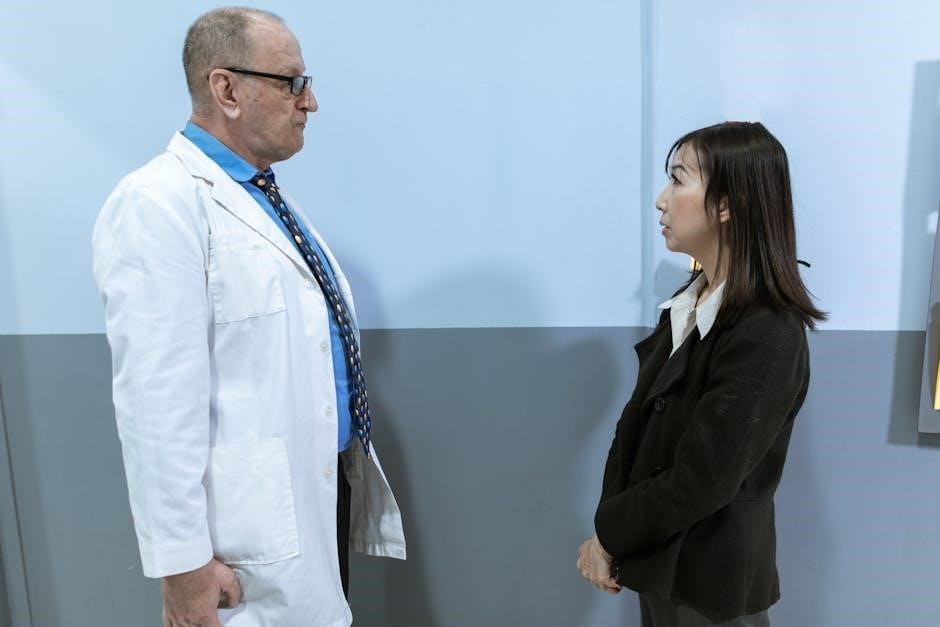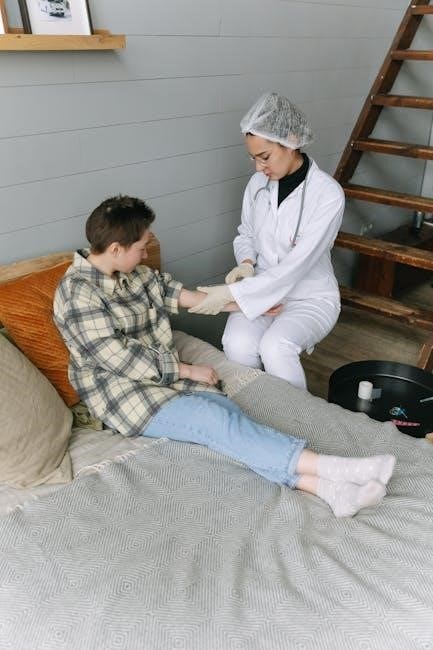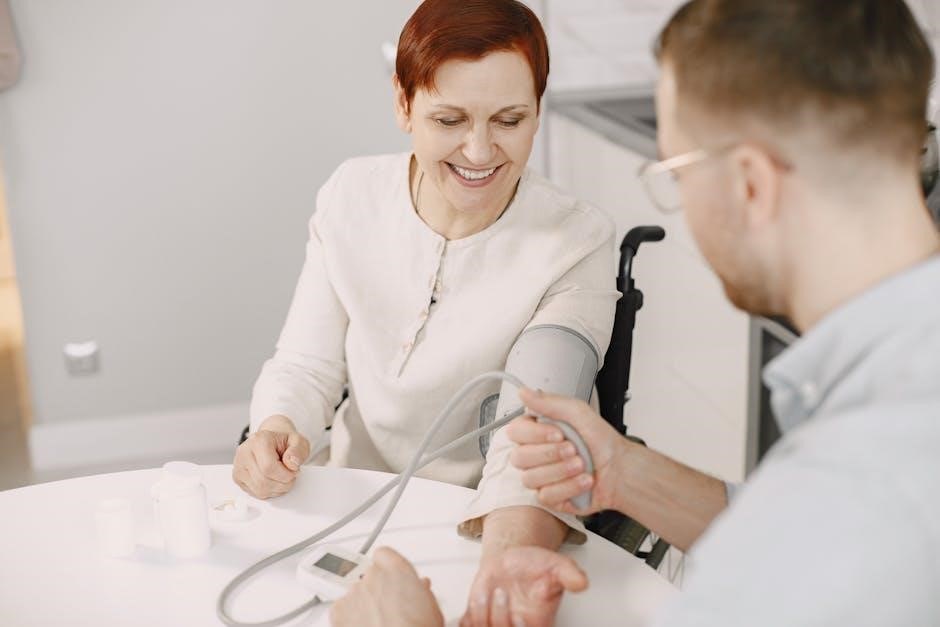Definition of Doctor-Patient Relationship in Massachusetts Jury Instructions
A doctor-patient relationship in Massachusetts jury instructions begins when a doctor evaluates, cares for, or treats a patient, requiring more than casual interaction. Virtual visits, such as phone calls or video conferences, can establish this relationship, forming a professional duty of care.
1.1. When a Doctor-Patient Relationship Begins
A doctor-patient relationship in Massachusetts begins when a doctor engages in the evaluation, care, or treatment of a patient. This requires active participation, such as diagnosing or prescribing, beyond a casual conversation. Virtual visits, like phone calls or video conferences, can also establish this relationship, demonstrating a professional duty of care. The relationship is formed when the doctor undertakes responsibility for the patient’s medical needs, creating a formal bond that imposes legal and ethical obligations on the physician to act in the patient’s best interests.
1.2. Key Elements of the Doctor-Patient Relationship
The key elements of a doctor-patient relationship in Massachusetts include mutual understanding, professional duty, and the purpose of medical care. A doctor must actively participate in the patient’s evaluation, care, or treatment, creating a formal bond. This relationship requires more than casual interaction, involving a commitment to the patient’s well-being. Confidentiality and trust are central, with the doctor obligated to act in the patient’s best interests. The relationship may also involve virtual visits, such as telemedicine, which can establish the same professional duties as in-person care, ensuring consistent standards of medical responsibility and ethical practice.
1.3. Virtual Visits and the Formation of the Relationship
A doctor-patient relationship can be established through virtual visits, such as phone calls or video conferences, in Massachusetts. These interactions are recognized as valid forms of care, creating a professional duty. Virtual visits must involve active participation in the patient’s evaluation or treatment to form the relationship. This ensures that the doctor-patient bond is not limited to in-person interactions, reflecting modern healthcare practices. The relationship is formed when the doctor engages in care, regardless of the medium, establishing the same professional obligations as traditional in-person visits.

Legal Standards for Establishing a Doctor-Patient Relationship
The legal standards require a doctor’s active participation in a patient’s care, involving evaluation, treatment, or advice, to establish a valid doctor-patient relationship in Massachusetts.

2.1. Requirements for a Valid Doctor-Patient Relationship
A valid doctor-patient relationship in Massachusetts requires a doctor’s active participation in the patient’s care, involving evaluation, treatment, or advice. It must be mutually understood that the doctor is providing professional services, beyond casual conversations. Virtual visits, such as video calls, can satisfy this requirement if they involve medical evaluation or treatment. The relationship is not limited to direct physical treatment but includes telemedicine and other forms of professional interaction aimed at patient care.
2.2. Evidentiary Standard for Proving the Relationship
To prove a doctor-patient relationship in Massachusetts, evidence must show the doctor actively participated in the patient’s care, such as through evaluation, treatment, or advice. This can include medical records, testimony from the patient or doctor, or documentation of virtual visits. The relationship must be established by a preponderance of the evidence, demonstrating a mutual understanding that professional services were being provided. Expert testimony may also clarify the nature of interactions, ensuring the relationship meets legal standards for validity in civil cases.

Implications of the Doctor-Patient Relationship in Jury Instructions

The doctor-patient relationship in jury instructions emphasizes confidentiality and privilege, with clear guidelines explaining termination to ensure legal standards are met.
3.1. Confidentiality and Privilege in the Relationship
In Massachusetts, the doctor-patient relationship is protected by confidentiality and privilege, ensuring patient information remains private. Jury instructions emphasize that communications between a doctor and patient are privileged, meaning they cannot be disclosed without consent, except in specific legal circumstances. This privilege is designed to foster trust and open communication in the relationship. Massachusetts law, including the Patient-Physician Relationship Protection Act, reinforces these protections. Jury instructions often clarify these boundaries to ensure jurors understand the legal implications of confidentiality in medical cases.
3.2. Termination of the Doctor-Patient Relationship
The termination of a doctor-patient relationship in Massachusetts occurs when either party ends the professional connection. Jury instructions specify that termination can happen through mutual agreement, patient dismissal, or physician withdrawal. Proper termination requires clear communication and documentation. Physicians must ensure patients are informed and arrangements made for continued care. Improper termination can lead to legal consequences, as seen in cases where patients were not adequately notified. Massachusetts law emphasizes the importance of maintaining ethical standards during termination to protect patient rights and prevent potential disputes.

Cases Involving Sexual Misconduct in the Doctor-Patient Relationship

Massachusetts has seen several high-profile cases involving sexual misconduct by doctors, leading to indictments and criminal charges. These cases highlight the legal consequences of exploiting the doctor-patient relationship, emphasizing the need for accountability and patient protection.
4.1. Recent Indictments of Massachusetts Doctors
Massachusetts has recently seen several indictments of doctors for sexual misconduct. A Worcester County grand jury indicted Dr. Ho Yin Aaron Shiu for allegedly sexually assaulting two female patients. Similarly, Dr. Derrick Todd faced criminal rape charges after being accused of assaulting over 200 patients. These cases underscore the severity of exploitation within the doctor-patient relationship, highlighting the legal system’s role in holding healthcare providers accountable. Such indictments reflect growing scrutiny of professional boundaries and the importance of safeguarding patient trust.
4.2. Legal Consequences of Exploiting the Relationship
Exploiting the doctor-patient relationship in Massachusetts leads to severe legal consequences, including criminal charges and civil liability. Doctors may face imprisonment, fines, and license revocation. Civil lawsuits can result in substantial damages for emotional distress and harm. The state’s legal system prioritizes patient protection, ensuring accountability for such violations. These consequences aim to maintain trust and uphold ethical standards in healthcare, safeguarding patients from abuse and neglect within the professional relationship.

Medical Malpractice and the Doctor-Patient Relationship
Medical malpractice claims require proving a doctor-patient relationship existed, the professional violated the standard of care, and the breach caused harm to the patient.
5.1. Proving Negligence in Medical Malpractice Cases
Proving negligence in Massachusetts medical malpractice cases requires showing a doctor-patient relationship, breach of the standard of care, causation, and resulting damages. The claimant must demonstrate that the healthcare provider failed to meet the standard of care expected under similar circumstances, directly causing harm. This involves establishing what a reasonable professional would have done and how the defendant’s actions fell short. Expert testimony is often critical to explain complex medical practices and link the breach to the patient’s injuries or worsened condition, whether physical or emotional.
5.2. Standard of Care in the Doctor-Patient Relationship
The standard of care in a doctor-patient relationship refers to the level of skill, care, and diligence that a reasonable healthcare professional would exercise under similar circumstances. In Massachusetts, this standard is central to medical malpractice claims. It is determined by expert testimony, which outlines what a competent practitioner would have done in the same situation. The standard applies to both in-person and virtual visits, ensuring consistent care quality. Failure to meet this standard can result in legal liability for harm caused to the patient, whether through action or omission.
Jury Instructions on the Doctor-Patient Relationship
Jury instructions in Massachusetts define the doctor-patient relationship and outline the legal standards for care, ensuring jurors understand the duties and boundaries of healthcare providers.
6.1. Pattern Jury Instructions for Civil Cases
Massachusetts pattern jury instructions for civil cases provide clear guidance on the doctor-patient relationship, outlining the duty of care and standards for medical professionals. These instructions help jurors understand the legal framework, including the formation of the relationship through virtual or in-person visits. They emphasize the importance of confidentiality and the professional obligations of healthcare providers. The instructions also address how breaches of duty may constitute negligence or malpractice. By standardizing these explanations, they ensure consistency in how jurors evaluate evidence and reach verdicts in civil cases involving medical professionals.
6.2. Role of the Judge in Jury Instructions
The judge plays a crucial role in jury instructions by ensuring that the law is accurately and clearly communicated to the jury. In Massachusetts, judges are responsible for defining the doctor-patient relationship and outlining the duties of healthcare professionals. They must also address any objections from the prosecution or defense regarding the instructions. By guiding the jury on how to apply the law to the evidence presented, judges help ensure a fair and informed trial. This role is essential in maintaining the integrity and fairness of the legal process.

High-Profile Cases and Their Impact on Jury Instructions
High-profile cases involving doctor-patient relationships often shape jury instructions by setting legal precedents and clarifying standards for professional conduct and liability in medical practice.
7.1. Landmark Cases in Massachusetts
In Massachusetts, landmark cases have significantly influenced jury instructions regarding the doctor-patient relationship. Cases involving sexual misconduct, such as those against Dr. Ho Yin Aaron Shiu and Dr. Derrick Todd, highlighted the importance of confidentiality and professional boundaries. These cases led to clearer definitions of the duty of care and the termination of the doctor-patient relationship. The rulings emphasized the need for explicit jury instructions to address exploitation and negligence, ensuring jurors understand the legal standards for professional conduct in medical practice.
7.2. How Jury Verdicts Shape Legal Precedents
Jury verdicts in Massachusetts significantly influence legal precedents by setting standards for future cases involving the doctor-patient relationship. These verdicts often clarify the boundaries of professional duty and negligence, guiding judges in refining jury instructions. High-profile cases, such as those involving sexual misconduct, underscore the importance of clear guidelines for jurors. Over time, these decisions establish a framework for understanding the doctor-patient relationship, ensuring consistency in how courts interpret and apply the law. This evolution reflects the dynamic interplay between jury outcomes and the development of legal standards.